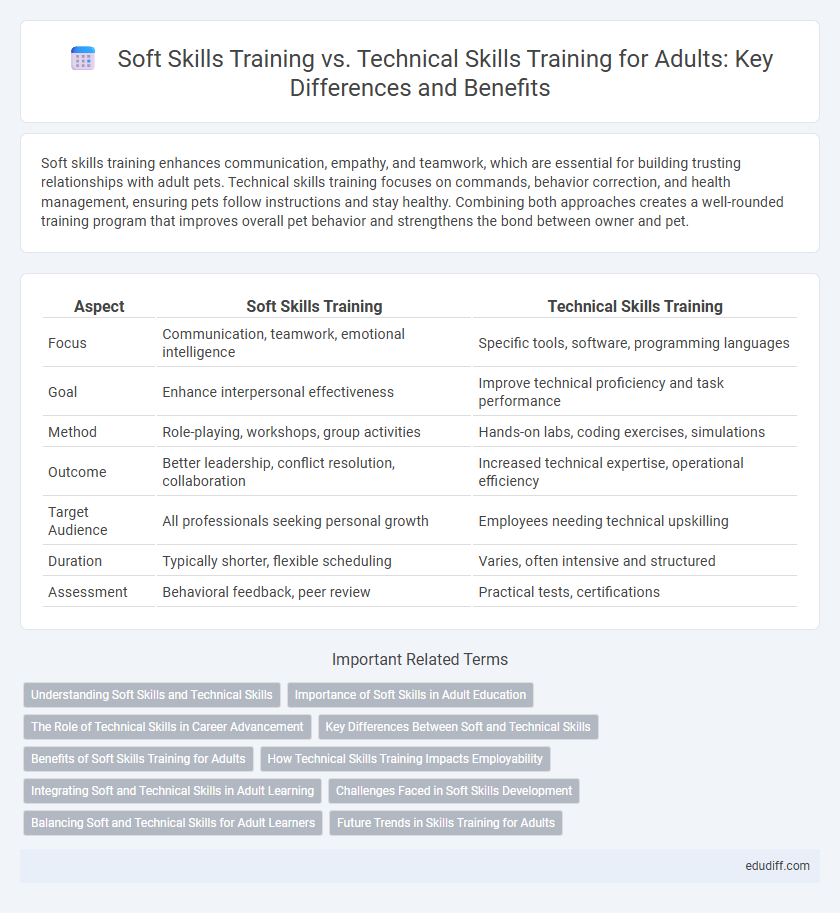Soft skills training enhances communication, empathy, and teamwork, which are essential for building trusting relationships with adult pets. Technical skills training focuses on commands, behavior correction, and health management, ensuring pets follow instructions and stay healthy. Combining both approaches creates a well-rounded training program that improves overall pet behavior and strengthens the bond between owner and pet.
Table of Comparison
| Aspect | Soft Skills Training | Technical Skills Training |
|---|---|---|
| Focus | Communication, teamwork, emotional intelligence | Specific tools, software, programming languages |
| Goal | Enhance interpersonal effectiveness | Improve technical proficiency and task performance |
| Method | Role-playing, workshops, group activities | Hands-on labs, coding exercises, simulations |
| Outcome | Better leadership, conflict resolution, collaboration | Increased technical expertise, operational efficiency |
| Target Audience | All professionals seeking personal growth | Employees needing technical upskilling |
| Duration | Typically shorter, flexible scheduling | Varies, often intensive and structured |
| Assessment | Behavioral feedback, peer review | Practical tests, certifications |
Understanding Soft Skills and Technical Skills
Soft skills encompass interpersonal abilities like communication, teamwork, and problem-solving that enhance workplace collaboration and adaptability. Technical skills involve specific knowledge and expertise in tasks such as coding, machinery operation, or data analysis crucial for job performance. Understanding the distinction helps organizations tailor training programs to develop both personal effectiveness and specialized competencies.
Importance of Soft Skills in Adult Education
Soft skills training enhances communication, teamwork, and problem-solving abilities crucial for adult learners' professional and personal success. Emphasizing emotional intelligence and adaptability equips adults to navigate workplace dynamics effectively, complementing technical expertise. Integrating soft skills into adult education fosters holistic development, increasing employability and career advancement opportunities.
The Role of Technical Skills in Career Advancement
Technical skills form the foundation for career advancement by enabling professionals to perform job-specific tasks efficiently and adapt to evolving industry standards. Mastery of technical competencies such as coding, data analysis, or machinery operation often leads to higher productivity, eligibility for promotions, and competitive salary increments. Organizations prioritize employees with strong technical skills to drive innovation, improve operational workflows, and maintain a competitive edge in the market.
Key Differences Between Soft and Technical Skills
Soft skills training focuses on interpersonal abilities such as communication, teamwork, and emotional intelligence, essential for effective collaboration and leadership in the workplace. Technical skills training, on the other hand, emphasizes specialized knowledge and practical expertise in specific tools, software, or industry-related techniques critical for job performance and productivity. The key differences lie in soft skills enhancing personal interactions and adaptability, while technical skills drive the execution of professional tasks and problem-solving capabilities.
Benefits of Soft Skills Training for Adults
Soft skills training enhances communication, emotional intelligence, and problem-solving abilities, crucial for adult learners navigating complex workplace dynamics. Developing teamwork, leadership, and adaptability through soft skills leads to improved job performance and career advancement opportunities. Employers increasingly value soft skills as they contribute to a positive work environment and effective collaboration across diverse teams.
How Technical Skills Training Impacts Employability
Technical skills training directly enhances employability by equipping individuals with specific knowledge and practical abilities required in their industry, such as coding, machinery operation, or data analysis. Employers prioritize technical proficiency as it reduces onboarding time and increases productivity, making technically skilled candidates more competitive in the job market. Mastery of relevant technical skills correlates strongly with higher job retention rates and opportunities for career advancement in sectors like IT, engineering, and healthcare.
Integrating Soft and Technical Skills in Adult Learning
Integrating soft and technical skills in adult learning enhances workforce adaptability by combining effective communication, problem-solving, and leadership with specialized technical expertise. This holistic approach improves job performance, collaboration, and innovation, addressing complex work environments that require both interpersonal and technical proficiency. Tailored training programs emphasize real-world applications, ensuring adults can seamlessly apply integrated skills to dynamic professional challenges.
Challenges Faced in Soft Skills Development
Soft skills training often encounters challenges such as measuring progress, overcoming participant resistance, and addressing diverse personality traits that affect communication and teamwork abilities. Unlike technical skills, soft skills like emotional intelligence, adaptability, and conflict resolution require continuous practice and real-life application, making standardized assessment difficult. Organizations must invest in personalized coaching and create supportive environments to effectively nurture these critical interpersonal competencies.
Balancing Soft and Technical Skills for Adult Learners
Balancing soft skills training with technical skills development is essential for adult learners to enhance workplace performance and adaptability. Soft skills such as communication, problem-solving, and emotional intelligence complement technical expertise, fostering collaboration and leadership abilities. Integrating both training types ensures adults are well-rounded professionals capable of navigating complex, dynamic work environments.
Future Trends in Skills Training for Adults
Future trends in adult skills training emphasize a balanced integration of soft skills like emotional intelligence, communication, and adaptability with advanced technical skills including AI proficiency, data analytics, and cybersecurity. Personalized learning platforms leverage AI-driven analytics to tailor training programs, enhancing skill retention and relevance for career growth. Hybrid training models combining virtual reality simulations and interactive workshops enable adults to acquire both interpersonal and technological capabilities essential for the evolving workforce.
Soft Skills Training vs Technical Skills Training Infographic

 edudiff.com
edudiff.com